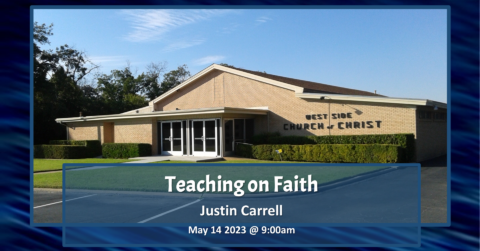Category: Faith
Subject: Faith
The Practice of Your Faith

In the last chapter of Colossians, after giving some specific instruction regarding familial responsibilities, the great apostle ended his admonitions to his readers with some general instruction in living the Christian life. Note the following, in Colossians 4:2-6:
“Continue earnestly in prayer, being vigilant in it with thanksgiving; meanwhile praying also for us, that God would open to us a door for the word, to speak the mystery of Christ, for which I am also in chains, that I may make it manifest, as I ought to speak. Walk in wisdom toward those who are outside, redeeming the time. Let your speech always be with grace, seasoned with salt, that you may know how you ought to answer each one.”
These verses serve as an inspired explanation of James’ contention, “But someone will say, ‘You have faith, and I have works.’ Show me your faith without your works, and I will show you my faith by my works” (James 2:18). These admonitions of Paul in Colossians 4 begin to flesh out that of which a life of faith should consist. Continue reading “The Practice of Your Faith” →
It Takes All Kinds

This important lesson is illustrated in 1 Kings 18. The prophet Elijah was in conflict with King Ahab. The conflict had led Elijah to proclaim a drought in the land which lasted for several years. “As the Lord God of Israel lives, before whom I stand, there shall not be dew nor rain these years, except at my word” (1 Kings 17:1). This was in response to Ahab’s sin.
During the drought (just before Elijah’s prayer brought it to an end, and before Ahab knew it was about to end), the Lord told Elijah to go and present himself to Ahab. Continue reading “It Takes All Kinds” →
Sermon: The Sinner’s Prayer

The Bible indeed teaches that we must receive the gift of God’s grace to be saved. How do we receive it? Scripture reveals that it IS NOT by saying a “Sinner’s Prayer.”
Sermon Powerpoint View and Download:
<<———><><———>>
Sermon: The Just Shall Live By Faith

An examination of the phrase found in Habakkuk 2:4, establishing the difference between the proud and insolent, and the believer who humbles himself before God.
Sermon Powerpoint View and Download:
<<———><><———>>
Sermon: Fear’s Snare and Faith’s Haven

Guest speaker Jeremiah Cox discusses Proverbs 29:25, showing that trust in God overcomes any fear that is caused by man.
Sermon Powerpoint View and Download:
<<———><><———>>
Mining the Scriptures: Luke 1:39-45

In Luke 1:36, Elizabeth (an older woman) is identified as a relative of the virgin Mary. She had conceived in her old age, blessed by God, and would eventually give birth to John the Baptist.
Mary went to Elizabeth, and when they met, we are told, the babe leapt in Elizabeth’s womb. This is a strong pro-life passage. The word babe is from the Greek brephos and refers, depending upon the passage, to either an unborn child or a small child, an infant. Two things are noted in verse 41. The fetus was a baby, and the baby “leaped” indicating life. This is scripture and logical. Only God has the right to determine when life begins, not men. It seems here that the unborn child of Elizabeth is regarding by the Holy Spirit as being alive.
Elizabeth understood the significance of the visit. She called Mary, the “mother of my Lord” (43). She was honored by the visit.
Verse 45 indicates that Elizabeth recognized the faith of Mary. Mary believed what the angel said. Mary could be said to be the first to have faith in Jesus. Her life from that point on would be eventful!
What Happens When We Are Faithful?

Ian Tilley talks about the benefits as well as the cost of being a faithful child of God.
Sermon Powerpoint View and Download:
<<———><><———>>
Sermon: Characteristics Needed for True Faith

Ian Tilley describes a few of the characteristics needed to have true faith.
Heroes of Faith
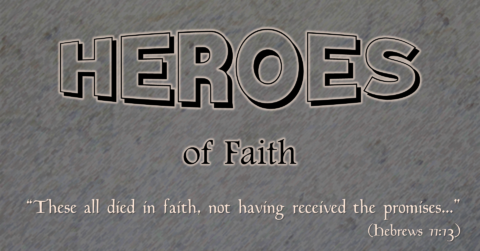
Our lesson details several men of Hebrews 11, Enoch, Gideon, Barak and Jephthah whose faith is noted in the chapter, as an example for us to follow!
Sermon Powerpoint View and Download:
<<———><><———>>
Salvation by Grace Through Faith
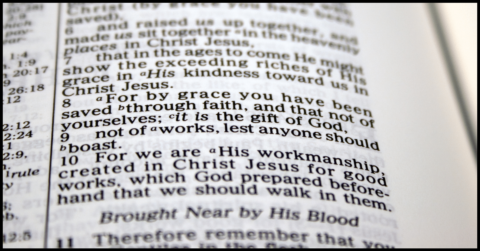
An important discussion of the Apostle Paul in his letter to the Ephesians is summarized in Ephesians 2:8-9. This passage is familiar to all:
“For by grace you have been saved through faith, and that not of yourselves; it is the gift of God, not of works, lest anyone should boast.”
So often Christians have to discuss what the text is not saying, so as to protect against the doctrine of “Salvation by Faith Only.” This is laudable, and not to be criticized. But, it is good to simply express the truths that are established by this passage. Continue reading “Salvation by Grace Through Faith” →
Paul’s Letter to the Galatians
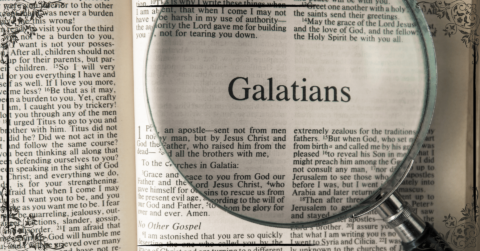
Paul always had a purpose in his writing. When writing to the churches in the province of Galatia, he sought to correct some errors they had been led to, by men who opposed Paul just about everywhere he went.
These men were Judaizers, desiring to bind the covenant of circumcision and adherence to the law upon the Gentiles. They opposed what Paul taught, and sought to both contradict him, and delegitimize him in the eyes of others.
So, Paul began by defending his apostleship. He was not a usurper, but had been chosen by Jesus Himself (cf. Acts 9). What he taught had been accepted by the church in Jerusalem, and sanctioned by God (cf. Acts 15:1-35).
By Faith

The eleventh chapter of Hebrews has been called the roll call of faith. It lists a great number of luminaries who obeyed God, motivated by their faith toward Him.
We are told in Romans 10:17, “So then faith comes by hearing, and hearing by the word of God.” Each of these individuals heard God’s word and believed it. This led to their actions and their acceptance by God. Continue reading “By Faith” →
Sermon: Teaching on Faith
Moses and Jesus – Servant and Son
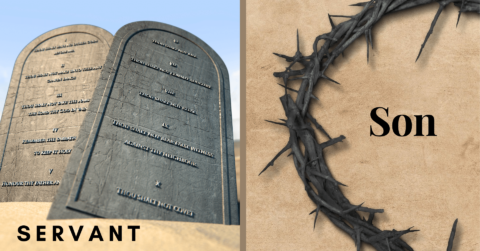
“Therefore, holy brethren, partakers of the heavenly calling, consider the Apostle and High Priest of our confession, Christ Jesus, 2 who was faithful to Him who appointed Him, as Moses also was faithful in all His house. 3 For this One has been counted worthy of more glory than Moses, inasmuch as He who built the house has more honor than the house. 4 For every house is built by someone, but He who built all things is God. 5 And Moses indeed was faithful in all His house as a servant, for a testimony of those things which would be spoken afterward, 6 but Christ as a Son over His own house, whose house we are if we hold fast the confidence and the rejoicing of the hope firm to the end” (Hebrews 3:1-6).
The book of Hebrews seeks to contrast all that surrounds Christ and His covenant with what came before. In every comparison made, Christ, and all that surrounds His life, ministry, death, covenant and body is better. It is fuller, more powerful, more important, more effective, more sublime.
The reason for this comparison was that Jews who had accepted Jesus as their Christ and Lord were reluctant to move on from the Law of Moses. This was unfortunate, and something that put their standing with God in jeopardy. This the writer made clear: “For on the one hand there is an annulling of the former commandment because of its weakness and unprofitableness, 19 for the law made nothing perfect; on the other hand, there is the bring in of a better hope, through which we draw near to God” (Hebrews 7:18-19).
One of the obvious comparisons would be between Moses and Jesus. Moses was the lawgiver. He would be considered by the Jews as the most important messenger from God. He was given the responsibility of shepherding Israel out of Egyptian bondage, leading them through the wilderness for a generation, and ushering them to the borders of Canaan. In all ways Moses was “faithful in His house” (Hebrews 3:2). Whose house? Not his own. Moses was a servant in the house of God.
The distinction is easy to see. “He who built the house has more honor than the house” (3). There is a great deal of difference between the Master of the house, its owner — and the servant. Jesus Christ is “a Son over His own house” (6) in contrast to the position of faithful servant attributed to Moses.
- Moses was a prophet, Jesus is the Son. “God, who at various ways spoke in time past to the fathers by the prophets, 2 has in these last days spoken to us by His Son” (1:1-2).
- Moses’ covenant was ushered in on the blood of animals, Jesus’ on His own blood. “For it is not possible that the blood of bulls and goats could take away sins” (10:4). “Therefore Jesus also, that He might sanctify the people with His own blood, suffered outside the gate” (13:12).
- No justification was to be found under Moses’ law, it comes through faith in Christ. “Therefore by the deeds of the law no flesh will be justified in His sight, for by the law is the knowledge of sin. 21 But now the righteousness of God apart from the law is revealed, being witnessed by the Law and the Prophets, 22 even the righteousness of God, through faith in Jesus Christ, to all and on all who believe…” (Romans 3:20-22).
- The intent of Moses’ law was to precede “those things which would be spoken afterward” (3:5), but Christ’s law is that which was spoken last (1:2). “But before faith came, we were kept under guard by the law, kept for the faith which would afterward be revealed. 24 Therefore the law was our tutor to bring us to Christ, that we might be justified by faith. 25 But after faith has come, we are no longer under a tutor” (Galatians 3:23-25).
- The Law of Moses ushered in an inferior priesthood to Christ, who is our High Priest after the order of Melchizedek. “But Christ came as High Priest of the good things to come, with the greater and more perfect tabernacle not made with hands, that is, not of this creation. 12 Not with the blood of goats and calves, but with His own blood He entered the Most Holy Place once for all, having obtained eternal redemption. 13 For if the blood of bulls and goats and the ashes of a heifer, sprinkling the unclean, sanctifies for the purifying of the flesh, 14 how much more shall the blood of Christ, who through the eternal Spirit offered Himself without spot to God, cleanse your conscience from dead works to serve the living God?” (Hebrews 9:11-14).
It is disheartening that even in our time religious people do not understand the significance of this contrast. There is a desire to make the appeal to the Law of Moses for authority and standing, not knowing that it abrogates our justification by faith in Christ Jesus. “You have become estranged from Christ, you who attempt to be justified by law; you have fallen from grace.” (Galatians 5:4). There is a difference between Moses and Jesus—The servant and the SON!




